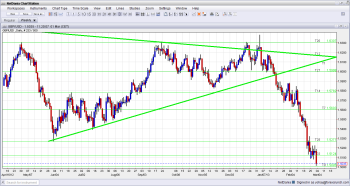The pound has been the whipping boy of the currency markets since the turn of the year. Recent declines in sterling are arguably justified given the uncertain outlook for the UK economy over the next few months. The economy is stuck between meagre growth and recession with higher inflation an extra kick in the teeth for consumers.
Sterling has already lost 8 per cent against the euro and 6 per cent against the dollar since the start of 2013. This directly impacts on prices as the cost of everything we import goes up, including fuel, which is US dollar denominated. The average price of petrol has increased across the UK by 5p per litre in the past month as these costs are being passed on to consumers.
Guest post by Phil McHugh, Senior Analyst at Currencies Direct
Ironically, those who have squirreled away savings—such as pensioners—could be the worst off. Record low interest rates on savings accounts across the UK are drastically devaluing nest eggs across the country. And a weak pound and high currency conversion charges will squeeze many expat pensioners’ ability to fund their cost of living. Europe is home to nearly 700,000 British expat pensioners whose purchasing power has been slashed as sterling has plummeted against the euro since the start of the year.
BoE policymaker Paul Tucker also indicated this week that negative interest rates should be considered to spur lending – a prospect which would likely be greeted with great scepticism amongst the City’s cash managers.
A significantly devalued pound will of course make the UK more attractive for foreign direct investment, but sluggish growth could see investors question whether or not they take a ride on what could be perceived as a sinking ship.
The winners of the day may be UK universities whose stellar reputations might entice foreign students to take advantage of a favourable exchange rate. International students already generate an estimated £8 billion per year in tuition fees to the UK economy.
Embattled Chancellor George Osborne has been clutching at straws to find a silver lining, especially after the Tories pinned their economic strategy on the hope that the UK maintains its AAA rating. In a particularly vitriolic Q&A session in Parliament this week, Osborne could only point to low interest rates, which he claimed are helping British families pay their mortgage bills and small businesses pay back their loans. But for all of the Chancellor’s bravado, little else was said about how the Coalition’s risky social experiment of tight fiscal and loose monetary policy will affect ordinary Britons.
While the plummeting pound appears to have levelled off in the short-term, a longer-term GBP devaluation certainly seems likely. The BoE is indicating more monetary support and tolerance for a weaker pound in order to buoy the UK export market and promote domestic growth.
Sterling was this week described as the ‘world’s worst performing currency’ of 2013, a title it looks set to maintain. Speculators’ knives will be sharpened further as we head towards the budget where Mr Osborne will try to convince the nation – and the markets – of the Government’s economic credibility.
Further reading: GBPUSD forecast.
